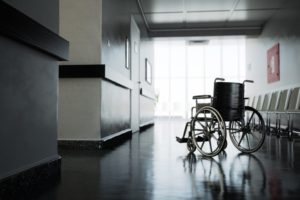It is natural to feel nervous about enrolling a loved one in a long-term care facility. Recent studies show that nursing home abuse is alarmingly common in the United States. According to the National Center on Elder Abuse, there is no way to know for sure just how prevalent elder abuse is, but researchers estimate that nearly 50 percent of people with dementia have been victims of some kind of abuse.
 According to the American Psychological Association, there are seven main kinds of elder abuse, and some types are easier to prove than others. For example, financial abuse typically leaves a paper trail, and physical abuse will result in bodily injuries that can be proven with photos, doctors’ records, witness testimonies, and a police report. Proving emotional abuse or neglect, however, is much more challenging, but that should not dissuade victims from making a claim against the at-fault caregiver or facility.
According to the American Psychological Association, there are seven main kinds of elder abuse, and some types are easier to prove than others. For example, financial abuse typically leaves a paper trail, and physical abuse will result in bodily injuries that can be proven with photos, doctors’ records, witness testimonies, and a police report. Proving emotional abuse or neglect, however, is much more challenging, but that should not dissuade victims from making a claim against the at-fault caregiver or facility.
If you or a member of your family was mistreated at a nursing home in Illinois, contact The Dinizulu Law Group, Ltd. Yao O. Dinizulu is a nursing home attorney in Chicago who will interview witnesses, gather evidence, and help you make a claim for the maximum compensation. Call 312-384-1920 to schedule a consultation.
How to Prove Nursing Home Negligence
In order to prove that your loved one was a victim of nursing home negligence, you or your attorney must demonstrate that:
- Nursing home staff had a duty to provide a certain standard of care for your loved one;
- Nursing home staff breached this duty of care;
- Your love one sustained an injury or illness as a result; and
- The injury caused some kind of damage.
The Duty of Care
When you enroll your loved one in a nursing home, you have certain expectations of the facility and the care its staff provides. The long-term care facility has an obligation to meet its residents’ basic needs. If nursing home staff fails to fulfill this obligation, they are breaching the duty of care, and depending on what happens as a result, you may have the right to sue.
A Breach of Duty
Proving there was a breach of duty is perhaps the hardest part of building a nursing home negligence case. Since neglect is not an active form of abuse, it may take a while for your loved one to exhibit symptoms that indicate the staff is not performing their caretaking duties.
Tangible proof of this breach of duty might include weight loss, malnutrition, or bedsores. As soon as you notice the signs of neglect, you should speak with an elder abuse attorney. Your lawyer will help you gather evidence before it disappears or otherwise becomes unavailable.
Damages
If the nursing home provided substandard care but your loved one did not suffer an injury, illness, or loss as a result, then you do not have grounds for a claim. In order to recover compensation, you must be able to prove that your loved one sustained damages as a direct result of the negligence.
Yao O. Dinizulu is a Chicago elder abuse lawyer who will calculate your damages and help you make a claim for the maximum compensation. Call 312-384-1920 to schedule a consultation with a nursing home abuse attorney. You can learn more about nursing home abuse claims in Illinois by visiting nursing-home-abuse.usattorneys.com/Illinois.



